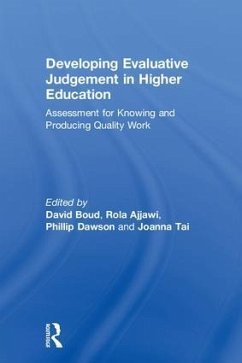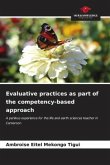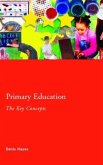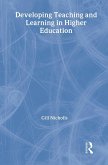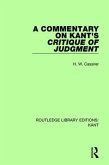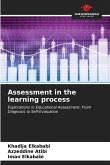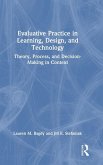Developing Evaluative Judgement in Higher Education
Assessment for Knowing and Producing Quality Work
Herausgeber: Boud, David; Dawson, Phillip; Ajjawi, Rola
Developing Evaluative Judgement in Higher Education
Assessment for Knowing and Producing Quality Work
Herausgeber: Boud, David; Dawson, Phillip; Ajjawi, Rola
- Gebundenes Buch
- Merkliste
- Auf die Merkliste
- Bewerten Bewerten
- Teilen
- Produkt teilen
- Produkterinnerung
- Produkterinnerung
Tracing the historical and socio-cultural development of evaluative judgement, and bringing together evidence and practice design from a range of disciplines, this book demystifies the concept of evaluative judgement and shows how it might be integrated and in a range of pedagogical contexts.
Andere Kunden interessierten sich auch für
![Evaluative practices as part of the competency-based approach Evaluative practices as part of the competency-based approach]() Ambroise Eitel Mekongo TiguiEvaluative practices as part of the competency-based approach29,99 €
Ambroise Eitel Mekongo TiguiEvaluative practices as part of the competency-based approach29,99 €![Primary Education Primary Education]() Denis HayesPrimary Education37,99 €
Denis HayesPrimary Education37,99 €![EVALUATIVE PEDAGOGICAL KNOWLEDGE OF TEACHERS WORKING IN THE SCHOOL EVALUATIVE PEDAGOGICAL KNOWLEDGE OF TEACHERS WORKING IN THE SCHOOL]() Katherine Roberts SánchezEVALUATIVE PEDAGOGICAL KNOWLEDGE OF TEACHERS WORKING IN THE SCHOOL54,99 €
Katherine Roberts SánchezEVALUATIVE PEDAGOGICAL KNOWLEDGE OF TEACHERS WORKING IN THE SCHOOL54,99 €![Developing Teaching and Learning in Higher Education Developing Teaching and Learning in Higher Education]() Gill NichollsDeveloping Teaching and Learning in Higher Education29,99 €
Gill NichollsDeveloping Teaching and Learning in Higher Education29,99 €![A Commentary on Kant's Critique of Judgement A Commentary on Kant's Critique of Judgement]() H. W. CassirerA Commentary on Kant's Critique of Judgement70,99 €
H. W. CassirerA Commentary on Kant's Critique of Judgement70,99 €![Assessment in the learning process Assessment in the learning process]() Khadija ElkababiAssessment in the learning process29,99 €
Khadija ElkababiAssessment in the learning process29,99 €![Evaluative Practice in Learning, Design, and Technology Evaluative Practice in Learning, Design, and Technology]() Lauren M BagdyEvaluative Practice in Learning, Design, and Technology187,99 €
Lauren M BagdyEvaluative Practice in Learning, Design, and Technology187,99 €-
-
-
Tracing the historical and socio-cultural development of evaluative judgement, and bringing together evidence and practice design from a range of disciplines, this book demystifies the concept of evaluative judgement and shows how it might be integrated and in a range of pedagogical contexts.
Hinweis: Dieser Artikel kann nur an eine deutsche Lieferadresse ausgeliefert werden.
Hinweis: Dieser Artikel kann nur an eine deutsche Lieferadresse ausgeliefert werden.
Produktdetails
- Produktdetails
- Verlag: Taylor & Francis Ltd (Sales)
- Seitenzahl: 202
- Erscheinungstermin: 12. April 2018
- Englisch
- Abmessung: 234mm x 156mm x 14mm
- Gewicht: 485g
- ISBN-13: 9781138089341
- ISBN-10: 1138089346
- Artikelnr.: 52456149
- Herstellerkennzeichnung
- Libri GmbH
- Europaallee 1
- 36244 Bad Hersfeld
- gpsr@libri.de
- Verlag: Taylor & Francis Ltd (Sales)
- Seitenzahl: 202
- Erscheinungstermin: 12. April 2018
- Englisch
- Abmessung: 234mm x 156mm x 14mm
- Gewicht: 485g
- ISBN-13: 9781138089341
- ISBN-10: 1138089346
- Artikelnr.: 52456149
- Herstellerkennzeichnung
- Libri GmbH
- Europaallee 1
- 36244 Bad Hersfeld
- gpsr@libri.de
Professor David Boud is Foundation Director of the Centre for Research in Assessment and Digital Learning (CRADLE), Deakin University, Australia. Dr Rola Ajjawi is Senior Research Fellow at CRADLE. Associate Professor Phillip Dawson is Associate Director of CRADLE. Dr Joanna Tai is Research Fellow at CRADLE.
List of figures and tables Acknowledgements List of Contributors Chapter 0
: Introduction: what is evaluative judgement? Section 1: Conceptualising
Evaluative Judgement Chapter 1: Conceptualising evaluative judgement for
sustainable assessment in higher education Chapter 2: Evaluative judgement
for learning to be in a digital world Chapter 3: Epistemic resourcefulness
and the development of evaluative judgement Section 2: Alternative
Theoretical Perspectives on Evaluative Judgement Chapter 4: Problematising
standards: representation or performance? Chapter 5: Barriers to the
cultivation of evaluative judgement: a critical and historical perspective
Chapter 6: Limits to evaluative judgement Chapter 7: Understanding,
assessing and enhancing student evaluative judgement in digital
environments Section 3: Approaches to Developing Evaluative Judgement
Chapter 8: Developing evaluative judgement: a self-regulated learning
perspective Chapter 9: Understanding self-regulated learning in open-ended
online assignment tasks Chapter 10: Exemplars, feedback and bias: how do
computers make evaluative judgements? Chapter 11: Developing students'
capacities for evaluative judgment through analysing exemplars Chapter 12:
Designing for technology-enabled dialogic feedback Chapter 13: The
practicalities of using assessment management to develop evaluative
judgement Chapter 14: Strategies for fostering the development of
evaluative judgement Section 4: Evaluative Judgement for Practice and Work
Chapter 15: Prefigurement, identities and agency: the disciplinary nature
of evaluative judgement Chapter 16: The role of peers in developing
evaluative judgement Chapter 17: Building evaluative judgement through the
process of feedback Chapter 18: Using workplace-learning narratives to
explore evaluative judgment in action Chapter 19: Creating an agenda for
developing students' evaluative judgement
: Introduction: what is evaluative judgement? Section 1: Conceptualising
Evaluative Judgement Chapter 1: Conceptualising evaluative judgement for
sustainable assessment in higher education Chapter 2: Evaluative judgement
for learning to be in a digital world Chapter 3: Epistemic resourcefulness
and the development of evaluative judgement Section 2: Alternative
Theoretical Perspectives on Evaluative Judgement Chapter 4: Problematising
standards: representation or performance? Chapter 5: Barriers to the
cultivation of evaluative judgement: a critical and historical perspective
Chapter 6: Limits to evaluative judgement Chapter 7: Understanding,
assessing and enhancing student evaluative judgement in digital
environments Section 3: Approaches to Developing Evaluative Judgement
Chapter 8: Developing evaluative judgement: a self-regulated learning
perspective Chapter 9: Understanding self-regulated learning in open-ended
online assignment tasks Chapter 10: Exemplars, feedback and bias: how do
computers make evaluative judgements? Chapter 11: Developing students'
capacities for evaluative judgment through analysing exemplars Chapter 12:
Designing for technology-enabled dialogic feedback Chapter 13: The
practicalities of using assessment management to develop evaluative
judgement Chapter 14: Strategies for fostering the development of
evaluative judgement Section 4: Evaluative Judgement for Practice and Work
Chapter 15: Prefigurement, identities and agency: the disciplinary nature
of evaluative judgement Chapter 16: The role of peers in developing
evaluative judgement Chapter 17: Building evaluative judgement through the
process of feedback Chapter 18: Using workplace-learning narratives to
explore evaluative judgment in action Chapter 19: Creating an agenda for
developing students' evaluative judgement
List of figures and tables Acknowledgements List of Contributors Chapter 0
: Introduction: what is evaluative judgement? Section 1: Conceptualising
Evaluative Judgement Chapter 1: Conceptualising evaluative judgement for
sustainable assessment in higher education Chapter 2: Evaluative judgement
for learning to be in a digital world Chapter 3: Epistemic resourcefulness
and the development of evaluative judgement Section 2: Alternative
Theoretical Perspectives on Evaluative Judgement Chapter 4: Problematising
standards: representation or performance? Chapter 5: Barriers to the
cultivation of evaluative judgement: a critical and historical perspective
Chapter 6: Limits to evaluative judgement Chapter 7: Understanding,
assessing and enhancing student evaluative judgement in digital
environments Section 3: Approaches to Developing Evaluative Judgement
Chapter 8: Developing evaluative judgement: a self-regulated learning
perspective Chapter 9: Understanding self-regulated learning in open-ended
online assignment tasks Chapter 10: Exemplars, feedback and bias: how do
computers make evaluative judgements? Chapter 11: Developing students'
capacities for evaluative judgment through analysing exemplars Chapter 12:
Designing for technology-enabled dialogic feedback Chapter 13: The
practicalities of using assessment management to develop evaluative
judgement Chapter 14: Strategies for fostering the development of
evaluative judgement Section 4: Evaluative Judgement for Practice and Work
Chapter 15: Prefigurement, identities and agency: the disciplinary nature
of evaluative judgement Chapter 16: The role of peers in developing
evaluative judgement Chapter 17: Building evaluative judgement through the
process of feedback Chapter 18: Using workplace-learning narratives to
explore evaluative judgment in action Chapter 19: Creating an agenda for
developing students' evaluative judgement
: Introduction: what is evaluative judgement? Section 1: Conceptualising
Evaluative Judgement Chapter 1: Conceptualising evaluative judgement for
sustainable assessment in higher education Chapter 2: Evaluative judgement
for learning to be in a digital world Chapter 3: Epistemic resourcefulness
and the development of evaluative judgement Section 2: Alternative
Theoretical Perspectives on Evaluative Judgement Chapter 4: Problematising
standards: representation or performance? Chapter 5: Barriers to the
cultivation of evaluative judgement: a critical and historical perspective
Chapter 6: Limits to evaluative judgement Chapter 7: Understanding,
assessing and enhancing student evaluative judgement in digital
environments Section 3: Approaches to Developing Evaluative Judgement
Chapter 8: Developing evaluative judgement: a self-regulated learning
perspective Chapter 9: Understanding self-regulated learning in open-ended
online assignment tasks Chapter 10: Exemplars, feedback and bias: how do
computers make evaluative judgements? Chapter 11: Developing students'
capacities for evaluative judgment through analysing exemplars Chapter 12:
Designing for technology-enabled dialogic feedback Chapter 13: The
practicalities of using assessment management to develop evaluative
judgement Chapter 14: Strategies for fostering the development of
evaluative judgement Section 4: Evaluative Judgement for Practice and Work
Chapter 15: Prefigurement, identities and agency: the disciplinary nature
of evaluative judgement Chapter 16: The role of peers in developing
evaluative judgement Chapter 17: Building evaluative judgement through the
process of feedback Chapter 18: Using workplace-learning narratives to
explore evaluative judgment in action Chapter 19: Creating an agenda for
developing students' evaluative judgement

